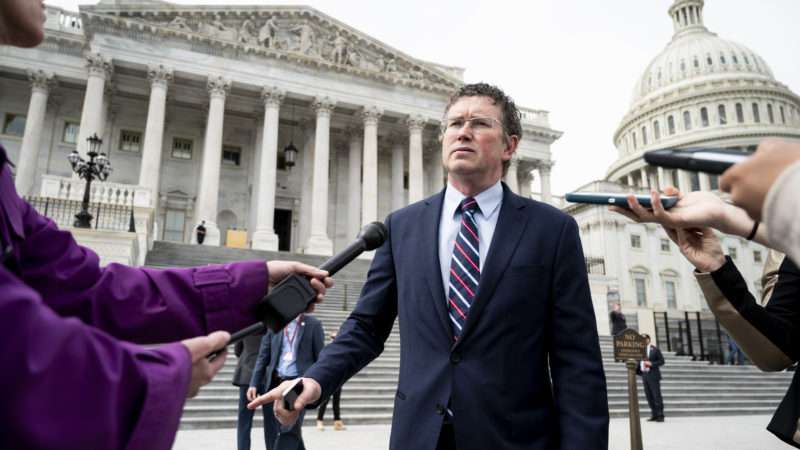
Rep. Thomas Massie (R–Ky.) is stoking outrage for being the lone dissenting vote on a seemingly unobjectionable resolution condemning antisemitism. But the congressman's opposition looks a lot more reasonable considering the resolution's implications for free speech and internet regulation.
On Wednesday, the House of Representatives passed H.R. 1125, which broadly condemns antisemitic speech and violence while also endorsing calls for more online monitoring and censorship of antisemitic views and conspiracy theories.
It passed the House 420-1. Massie's solitary "no" vote attracted heated criticism from some of the organizations that pushed for the resolution.
.@RepThomasMassie was the lone vote against yesterday's resolution condemning antisemitism.
While Democrats and Republicans united, Rep. Massie, who has also opposed bills on Holocaust education and Iron Dome funding, decided that combating rising hatred is not important. https://t.co/2FADADrkiH
— American Jewish Committee (@AJCGlobal) May 19, 2022
We are outraged to see Rep. Thomas Massie (R-KY) just vote no on a bi-partisan House resolution condemning antisemitism.
So far Massie is the sole no vote.
— StopAntisemitism (@StopAntisemites) May 18, 2022
Massie himself has said on Twitter that his opposition was based on free speech concerns.
I don't hate anyone based on his or her ethnicity or religion. Legitimate government exists, in part, to punish those who commit unprovoked violence against others, but government can't legislate thought.
This bill promoted internet censorship and violations of the 1st amendment https://t.co/MWkvcOba7K
— Thomas Massie (@RepThomasMassie) May 19, 2022
That's fair enough given some of the language contained in the resolution.
For starters, it includes a call for social media "to institute stronger and more significant efforts to measure and address online antisemitism while protecting free speech concerns."
Social media companies obviously can moderate content however they wish. If demoting or removing antisemitic speech is something they want to spend time and resources doing, that's their prerogative.
But politicians demanding social media companies adopt certain content moderation policies or priorities inherently raises free speech concerns, even if those demands are in the form of a nonbinding resolution.
The implication that social media companies will suffer political or regulatory consequences is inescapable, even if it does come with a free speech proviso.
That's particularly true in this context. The primary author of yesterday's resolution, Rep. Debbie Wasserman Schultz (D–Fla.) has pinned some of the blame for the fatal shooting in Buffalo, New York, on social media companies' amplification of "radicalizing content and conspiracy theories."
In response, she has argued for amending Section 230 of the Communications Decency Act (often described as the internet's First Amendment) so that social media companies can be held legally liable for views expressed on their platforms.
It's past time to pass sane gun safety laws, but we also need to revisit Section 230 to remove social media company immunity if they amplify radicalizing content and conspiracy theories that promote violence like we saw in Buffalo.https://t.co/DkfKPnqzh7
— Rep. Debbie Wasserman Schultz (@RepDWStweets) May 15, 2022
Yesterday's resolution also calls on Congress to work more closely with the Inter-Parliamentary Task Force to Combat Online Antisemitism—an international working group whose membership includes lawmakers from the U.K., Canada, Israel, the U.S., and Australia.
The task force's first briefing in November 2020 featured presentations from groups also calling for Section 230 reform and holding platforms and their executives accountable for antisemitic speech.
The House's antisemitism resolution also endorsed increasing funding for a Department of Homeland Security program that provides security grants to "at-risk houses of worship, schools, and community centers."
Given that the Department of Homeland Security shouldn't exist, expanding its funding doesn't sound like a good idea. One can see why a libertarian-leaning budget hawk like Massie wouldn't like that provision either.
It goes without saying that antisemitism, like any sort of racial or religious bigotry, is horrible. But the House's resolution does more than merely condemn it. Rather, it calls on social media companies to suppress otherwise protected speech and endorses more federal spending. That's reason enough to oppose it.
The post Thomas Massie Has a Point When He Says Congress' Antisemitism Resolution Has a Free Speech Problem appeared first on Reason.com.







